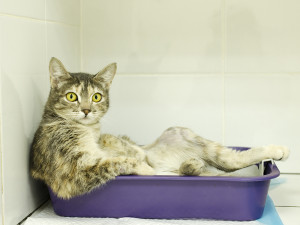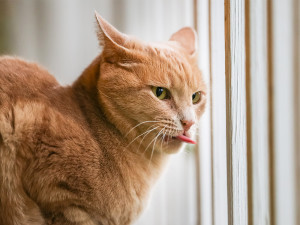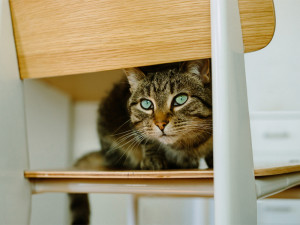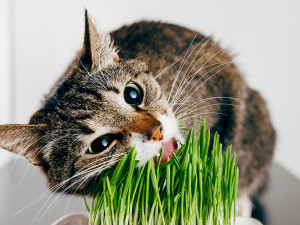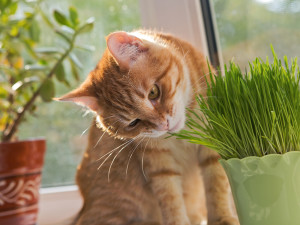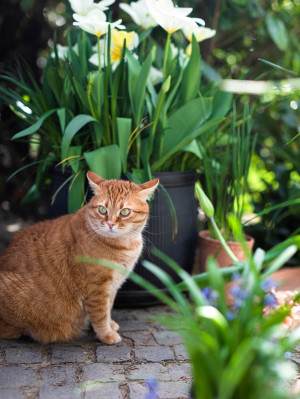Are Snake Plants Toxic to Cats?
All you need to know about snake plants — plus, other plants that are toxic (and safe).
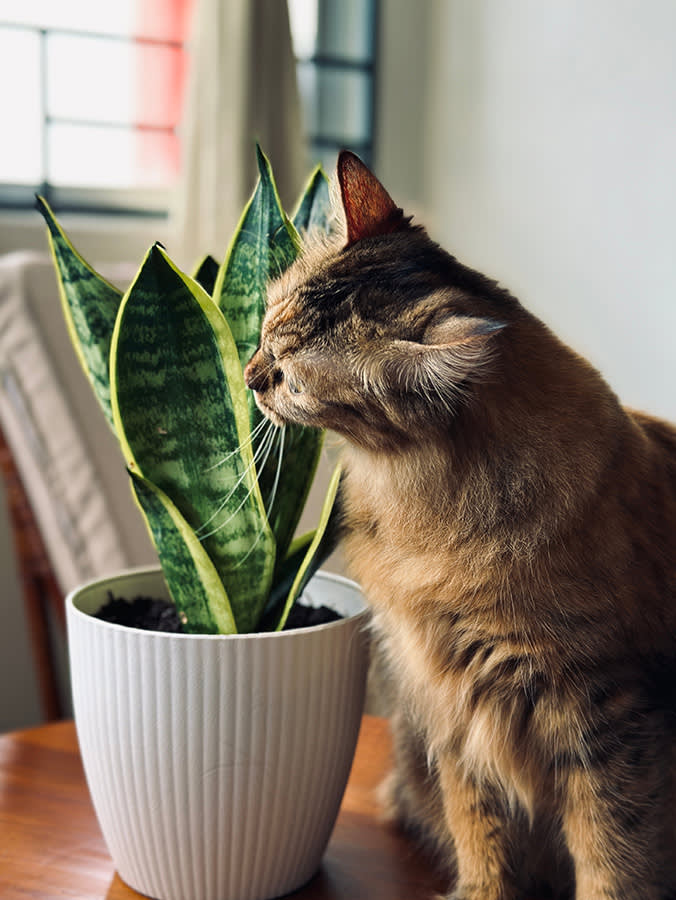
Share Article
In This Article:
The Nature of Snake Plants Are Snake Plants Toxic to Cats and Other Pets? What to Do if a Cat Has Eaten a Snake Plant? How to Prevent Snake Plant Poisoning Other Plants That Are Toxic to Cats Plants That Are Safe for Cats
While they may be popular house plants, snake plants are not something you want to have around your cat. It’s not the name that makes it a bad idea (although it does sound a little ominous), but snake plants are actually toxic to cats should your kitty nibble on them or even ingest some.
Can your snake plant and kitty happily live together? Read on for more details.
The nature of snake plants: species and variety
Most of us are looking for attractive plants that offer some air-purifying benefits to our homes. We also typically want something we don’t have to fuss with. This is when the low-maintenance snake plant seems appealing.

Common types of snake plants
A tropical plant that originated from Africa and Asia, there are more than 70 types of snake plantsopens in new tab out there. They vary in leaf length from six inches to eight feet. The leaves can be fat or skinny, have a distinctive pointy tip, and come in a variety of variegated color patterns. You’ll likely come across the smaller varieties for your home, such as Sansevieria trifasciata var. laurentii and Sansevieria cylindrica ‘Boncel.’
Benefits of snake plants
Snake plants are excellent air filters, removing carbon monoxide and formaldehyde from the air.
Easy to maintain, snake plants are slow-growing, drought tolerant, and prefer the temperatures and humidity of most households.
Its unique pointy leaves and color patterns make it an attractive focal point.
Drawbacks of snake plants
Snake plants are toxic to animals and humans, if ingested.
The leaf tips can be sharp, and if the tip is broken off, the leaf will stop growing.
Are snake plants toxic to cats and other pets?
Chemical composition
Snake plants contain saponins, compounds that contribute to their hardiness. Saponins help protect snake plants from insects, fungi, and bacteria. But when ingested, saponins really irritate the delicate linings of several body systems.
Why are snake plants toxic to cats? Are all parts of the plant poisonous?
All parts of a snake plant contain saponinsopens in new tab. These compounds can irritate the respiratory and digestive tract, potentially leading to diarrhea. Some saponins can also increase the permeability of a red blood cell’s membrane. If severe enough, this can cause the red blood cell to die. If enough red blood cells die, a cat can develop anemiaopens in new tab, which can have many negative repercussions.
What should I do if my cat has eaten a snake plant?
Most of the time your cat won’t eat enough snake plant to cause serious issues, so if you catch your cat in the act or find little nibble marks in your snake plant, watch closely for gastrointestinal signs. They should go away within a few days.
Symptoms of snake plant poisoning in cats
Snake plants are considered to be mild to moderately toxic to cats. Symptoms can range from oral irritation and nausea to severe vomiting and diarrhea. Symptoms of snake plant toxicity in cats include:
When to see a vet for snake plant poisoning
Take your cat to a veterinarian if they develop severe vomiting or diarrhea, weakness, or lethargy. If your cat doesn’t have any symptoms but you’re worried about the amount of snake plant ingested, you can also contact an animal poison-control center (such as ASPCA Animal Poison Controlopens in new tab or Pet Poison Helplineopens in new tab).
Diagnosing snake plant poisoning in cats
Vomiting and diarrhea are non-specific symptoms, meaning there are a myriad of possible causes for them. If your cat has access to a snake plant, or you find your snake plant disturbed, inform the veterinary staff so they can put it on the list of possible causes for your cat’s symptoms.
Treatment for snake plant poisoning in cats
Some cats can eat a small piece of snake plant without developing any issues. However, if caught early, your vet may induce vomiting or give them activated charcoal to rid their body of as much toxin as possible.
Cats who have symptoms after eating snake plants are treated symptomatically. This may include fluid therapy and medications for vomiting and diarrhea. If symptoms seem severe, bloodwork or other diagnostics may be recommended. Cats who develop profuse vomiting and/or diarrhea may require hospitalization.
How to prevent snake plant poisoning
The most effective way to prevent snake plant poisoning in cats is to make sure your cat does not have access to the plant. If there’s already a snake plant in your home, this may be easier said than done: Some curious cats will easily conquer any obstacles put in their way. If this is the case with your cat, find a new home for your snake plant and get a cat-safe replacement.
How do I stop my cat from eating snake plants?
The best way to stop your cat from eating a snake plant is to keep snake plants out of your cat’s environment. Some cats can be trained to stay away from certain items. The saponins in snake plants tend to make them bitter and would hopefully prevent your cat from eating too much (or any) plant material. But cats are weirdos, and some will chew on plants regardless of the taste. So don’t depend on the bitterness to keep them away. Just get rid of the plant, or keep your snake plant in a cat-free room or hanging where your cat can’t get to it.
Other plants that are toxic to cats
Along with snake plants, you’ll want to avoid having these plants in your home — or take special care to keep your cat away from them.
Easter lily (lilium wallichianum): True lilies (including tiger lily, Daylily, star lily, Japanese show lily, and others) are extremely toxic to cats. Cats who eat lilies are at risk of developing gastrointestinal signs within three hours of ingestion and acute kidney failure within three days. In some cases, lily ingestion can be fatal to cats.
Oleander (nerium oleander): All parts of oleander plants are toxic to cats. Oleanders contain cardiac glycosides, which are compounds that can cause vomiting, electrolyte imbalances, cardiac arrhythmias, tremors, seizures, and death.
Poinsettias (euphorbia pulcherrima): Poinsettias are ubiquitous during the winter holiday season, but they should be kept away from your cat. These plants contain irritating sap that can lead to drooling, vomiting, and diarrhea when ingested. Though uncommon, it can also cause irritation when it makes contact with skin and eyes.
Plants that are safe for cats
If you crave the look of indoor plants and their air-filtering abilities, here are some safe plant options for cats.
Rattlesnake plant (goeppertia insignis): This tropical plant is both cat-safe and gives the same lush look as snake plants.
Blushing bromeliad (neoregelia carolinae): These plants have scarlet blooms and are perfect for adding a pop of color to your home.
African violet (saintpaulia ionantha): African violets produce vibrant purple flowers that are safe for cats if they happen to nibble on them.
Bottom line
Though snake plants are a popular choice for indoor plant enthusiasts, they contain saponins that can cause digestive upset and even anemia if cats eat them.
Snake plant poisoning is typically mild in cats, because the bitter taste and sharp leaves prevent cats from eating a lot.
Regardless, snake plant poisoning can be serious. You should see your veterinarian if your cat has severe symptoms, or if they are without symptoms and have eaten a lot of a snake plant.
FAQs
What happens if a cat eats a snake plant?
Snake plants can cause gastrointestinal upset if ingested by a cat. Felines who eat snake plants are at risk of developing symptoms like nausea, anorexia, diarrhea, and/or vomiting.
Can cats eat snake plants safely?
Cats cannot eat snake plants safely. Snake plants are mildly to moderately toxic to cats. Saponin, a toxic compound, is most concentrated in the leaves, which are the easiest part of the plant for a cat to ingest.
Are snake plants poisonous to cats if they smell them?
Cats should not develop any signs of toxicity if they simply smell a snake plant. However, allowing your cat to have enough access to smell a snake plant should be discouraged because it means they also have enough access to eat it.
References
“Anemia.” Cornell Feline Health Center. https://www.vet.cornell.edu/departments-centers-and-institutes/cornell-feline-health-center/health-information/feline-health-topics/anemiaopens in new tab.
Damman, Aimee. “All About Snake Plants.” Swanson’s Nursery. 10 Jan 2021. https://www.swansonsnursery.com/blog/snake-plantopens in new tab.
“Saponins.” Cornell College of Agricultural and Life Sciences. https://poisonousplants.ansci.cornell.edu/toxicagents/saponin.htmlopens in new tab.

Dr. Chyrle Bonk, DVM
Dr. Chyrle Bonk has been a mixed-animal veterinarian since 2010, with a special interest in rehabilitation. When she's not practicing or writing about veterinary medicine, you may find her exploring the outdoors with her family or tending to her cows, horses, chickens, or cats and dogs.

Dr. Alycia Washington, DVM, MS
Alycia Washington is a small-animal emergency veterinarian with over 10 years of experience based in North Carolina. She works as a relief veterinarianopens in new tab and provides services to numerous emergency and specialty hospitals. She also works as a veterinary writer with a focus on educating pet parents.
Related articles
![Cat eating out of metal bowl]()
Top 10 Foods That Are Toxic to Cats
Sharing isn’t always caring. Keep your cat safe by keeping these human snack staples to yourself.
![Cat chewing on cat grass]()
The 10 Best Non-Toxic House Plants for Cats
Cats love the crunch of a houseplant. These will do them no harm.
![A dog laying under a table outside while a woman cares for her plants.]()
Follow These 4 Pet-Safe Pest Control Tips for Your Summer Garden
You need to be extra careful if your dog or cat is your gardening assistant.
![Cat sitting on a window sill eating cat grass]()
Sweet Greens: The Best Cat Grass Grow Kits
Not to be confused with catnip (or other buds).
![Ginger adult cat sits in flowering summer garden on pavement.]()
What to Do If Your Cat Gets Stung By a Bee
It’s not always as simple as removing the stinger. Find out everything you need to know.

